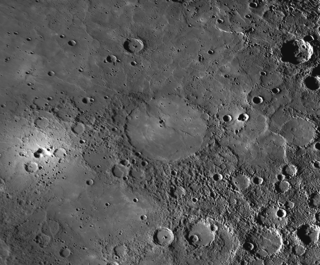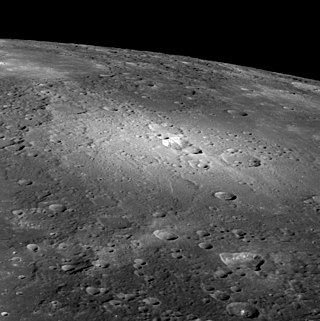
The Hokusai quadrangle (H-5) is one of fifteen quadrangles on the planet Mercury. It runs from 360 to 270° longitude and 20 to 70° latitude. Named after the Hokusai crater, it was mapped in detail for the first time after MESSENGER entered orbit around Mercury in 2011. It had not been mapped prior to that point because it was one of the six quadrangles that was not illuminated when Mariner 10 made its flybys in 1974 and 1975. These six quadrangles continued to be known by their albedo feature names, with this one known as the Apollonia quadrangle.

Matisse is an impact crater on the southern hemisphere of Mercury. Matisse takes its name from the French artist Henri Matisse, and it was named by the IAU in 1976.

Raphael is a crater on Mercury. Its name was adopted by the International Astronomical Union (IAU) in 1976, and is named for the Italian painter Raphael. It is Tolstojan in age. The crater was first imaged by Mariner 10 in 1974.

Praxiteles is a crater on Mercury. It is one of 110 peak ring basins on Mercury.

Copland is an impact crater on Mercury. Its floor is flooded with volcanic smooth plains material, which could be related to the activity that formed the nearby bright vent known as Nathair Facula.

Hesiod is a crater on Mercury. It has a diameter of 101 kilometers. Its name was adopted by the International Astronomical Union (IAU) in 1976. Hesiod is named for the Ancient Greek poet Hesiod, who lived around 800 BCE.

Kurosawa is a crater on Mercury. Its name was adopted by the International Astronomical Union (IAU) in 1976. Kurosawa is named for the Japanese composer Kinko Kurosawa, who lived in the 18th century CE.

Pahinui is a crater on Mercury. Its name was adopted by the International Astronomical Union in 2016, after the Hawaiian musician, Charles Phillip Kahahawai "Gabby" Pahinui.

Kuniyoshi is a crater on Mercury. Its name was adopted by the International Astronomical Union (IAU) in 2014. It is named for the Japanese painter and printmaker Utagawa Kuniyoshi.

Pampu Facula is a bright region on the surface of Mercury, located at 57.76° S, 31.79° W. It was named by the IAU in 2019. Pampu is the Tamil word for snake.

Nathair Facula is a bright region on the surface of Mercury, located at 36° N, 295.5° W. It was named by the IAU in 2018. Nathair is the Irish and Scottish Gaelic word for snake.

Neidr Facula is a bright, irregular depression on the surface of Mercury, located at 35.9° N, 302.7° W. It was named by the IAU in 2018. Neidr is the Welsh word for snake.

Zmija Facula is a bright region on the surface of Mercury, located within an unnamed crater that is itself within the larger Rembrandt basin. It was named by the IAU in June 2020. Zmija is the Serbian word for snake.

Donelaitis is a crater on Mercury. Its name was adopted by the International Astronomical Union (IAU) on May 15, 2013. Donelaitis is named for the Lithuanian poet Kristijonas Donelaitis.

Amaru Facula is a bright, irregular depression on the surface of Mercury, located at 49.8° S, 349.5° W. It was named by the IAU in 2018. Amaru is the Quechua word for snake.

Nākahi Facula is a bright, irregular depression on the surface of Mercury, located at 52.7° S, 342.2° W. It was named by the IAU in 2018. Nākahi is the Māori word for snake.

Wen Tianxiang is a crater on Mercury. Its name was adopted by the International Astronomical Union (IAU) in June 2020, and it is named for Chinese writer and poet Wen Tianxiang.

Suge Facula is a bright region on the surface of Mercury, located at 26.1 N, 300.4 W. It was named by the IAU in 2018. Suge is the Basque word for snake.

Coatl Facula is a bright region about 49 km wide on the surface of Mercury, located at 29.75° S, 216.55° W. It was named by the IAU in June 2020. Coatl is the Aztec (Nahuatl) word for snake.



















